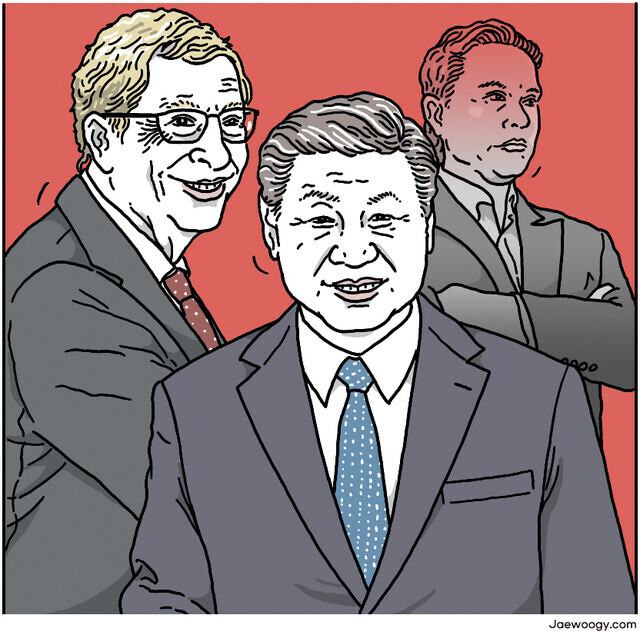hankyoreh
Links to other country sites 다른 나라 사이트 링크
[Column] Why Xi met with Gates, but not Musk

On Friday, right before US State Secretary Antony Blinken visited China, Chinese President Xi Jinping met Bill Gates, co-founder of Microsoft, in Beijing. Xi rarely meets with foreign entrepreneurs one-on-one, but what drew even more attention to the meeting was the fact that Xi particularly emphasized Gates as the “first American friend” he met in Beijing this year, treating him with utmost hospitality.
The reason Xi met with Gates one-on-one despite not having done the same with Tesla CEO Elon Musk, who visited China recently, is also noteworthy.
Musk not only owns a large Tesla factory in Shanghai but also has made statements supporting the Chinese government’s policies, such as the country’s “zero-COVID” policy or the Taiwan issue. During his stay in China from late May to early June, Musk met with the country’s foreign, industry, and commerce ministers, including First Vice Premier Ding Xuexiang, one after the other, but he did not meet with Xi. Tim Cook, CEO of Apple, and Jamie Dimon, CEO of JPMorgan Chase, recently visited China as well, but Xi only met with Gates.
While Gates is indeed an “old friend” China has done business with since the 1990s, the country’s strategic calculations also came into play.
To break through the US’ net of encirclement in regard to cutting-edge technology, China has been calling in US corporations into the country, and Xi has especially been paying attention to artificial intelligence (AI). Because China is leading the world in electric vehicles and batteries, it has no desperate need for Tesla’s technology. However, applying AI technology the likes of ChatGPT, which was developed through Gates’ investment, is important, especially when it comes to future industries and military power.
Chinese experts also say that Xi, who has stressed the “reunification of Taiwan” as the kernel of the “Chinese Dream,” is apprehensive of Starlink, the satellite internet operated by Musk. Paying close attention to the situation following Russia’s invasion of Ukraine, China has conducted research in case a similar situation happens in Taiwan. Especially, it took notice of the fact that, although it looked as if Russia would achieve a swift victory by destroying Ukraine’s internet, Ukraine ended up putting up a good fight on the battlefield as well as in the realm of public opinion by using Starlink’s satellite internet.
The South China Morning Post recently reported that the Chinese People’s Liberation Army, which believes satellite internets like Starlink will become important obstacles against China’s military operation or containment strategy against Taiwan and thus is wary of them, has begun a project code-named “GW” to set up its own satellite internet while also considering shooting satellites to an altitude of 700 kilometers to use them to shut down Starlink satellites operating at an altitude of 550 kilometers.
Blinken’s visit to China has made it look as if the US and China are engaging in dialogue amidst conflict, but distrust regarding sensitive issues like Taiwan and cutting-edge technology competition, as well as tension and competition, will continue on. Big Tech entrepreneurs like Gates and Musk are trying to gain as much as possible amidst competition between the US and China, and the decisions they make as people who have dominated technology and networks can change the future of the international order.
By Park Min-hee, editorial writer
Please direct questions or comments to [english@hani.co.kr]

Editorial・opinion
![[Guest essay] Preventing Korean Peninsula from becoming front line of new cold war [Guest essay] Preventing Korean Peninsula from becoming front line of new cold war](https://flexible.img.hani.co.kr/flexible/normal/500/300/imgdb/original/2024/0507/7217150679227807.jpg) [Guest essay] Preventing Korean Peninsula from becoming front line of new cold war
[Guest essay] Preventing Korean Peninsula from becoming front line of new cold war![[Column] The state is back — but is it in business? [Column] The state is back — but is it in business?](https://flexible.img.hani.co.kr/flexible/normal/500/300/imgdb/original/2024/0506/8217149564092725.jpg) [Column] The state is back — but is it in business?
[Column] The state is back — but is it in business?- [Column] Life on our Trisolaris
- [Editorial] Penalties for airing allegations against Korea’s first lady endanger free press
- [Editorial] Yoon must halt procurement of SM-3 interceptor missiles
- [Guest essay] Maybe Korea’s rapid population decline is an opportunity, not a crisis
- [Column] Can Yoon steer diplomacy with Russia, China back on track?
- [Column] Season 2 of special prosecutor probe may be coming to Korea soon
- [Column] Park Geun-hye déjà vu in Yoon Suk-yeol
- [Editorial] New weight of N. Korea’s nuclear threats makes dialogue all the more urgent
Most viewed articles
- 1[Guest essay] Preventing Korean Peninsula from becoming front line of new cold war
- 2Yoon’s broken-compass diplomacy is steering Korea into serving US, Japanese interests
- 360% of young Koreans see no need to have kids after marriage
- 4After 2 years in office, Yoon’s promises of fairness, common sense ring hollow
- 5[Reporter’s notebook] In Min’s world, she’s the artist — and NewJeans is her art
- 6S. Korean first lady likely to face questioning by prosecutors over Dior handbag scandal
- 7AI is catching up with humans at a ‘shocking’ rate
- 8[Column] Why Korea’s hard right is fated to lose
- 9‘Weddingflation’ breaks the bank for Korean couples-to-be
- 10[Column] The state is back — but is it in business?